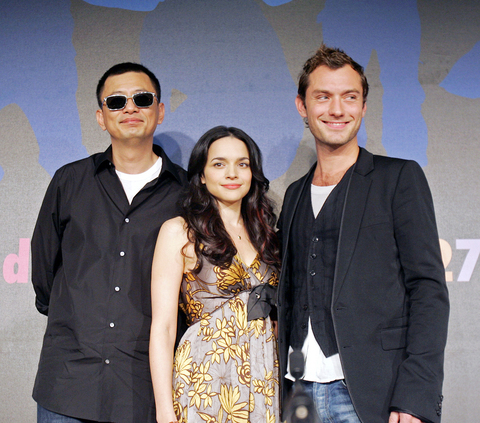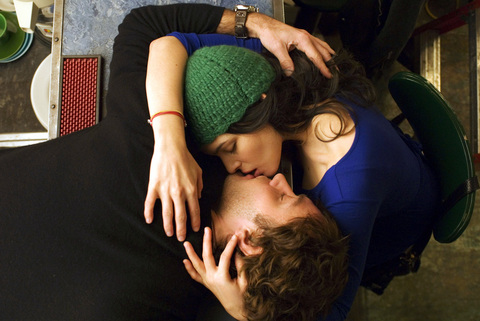Standing in the lobby of the Hotel Splendid, just a few blocks from the center of the Cannes Film Festival, Pierre Rissient, a kind of cinematic ambassador without portfolio and something of a local institution, paused to critique the festival's official souvenir bag.
Every year, the festival gives moviegoers a "gimme" bag to facilitate the schlepping of its sundry guides, catalogs and promotional materials. This year's version is colorfully printed with dozens of names of past winners of the Palme d'Or, including luminaries of world cinema like Roman Polanski, Akira Kurosawa and Michelangelo Antonioni. But Cannes is traditionally a place of controversy as well as adulation. Antonioni was booed when he presented L'Avventura in 1960, and a gaudy piece of swag can provoke argumentative passion as surely as a jury's vote or an auteur's vision. "Roland Joffe should not be here!" Rissient said, with indignation. Welcome to Cannes.
The festival is marking its 60th incarnation with a burst of nostalgic self-congratulation, evident not only in that bag but also in the equally ubiquitous publicity poster, which shows a collection of stars and cineastes leaping exuberantly in the air and is described in the official program as "an ecstasy of the pleasure of acting and creation!"

PHOTOS: AGENCIES
In between cold showers and new contenders for the Palme, audiences can sample ecstasies like John Farrow's 1953 western Hondo, starring John Wayne; three Shakespeare adaptations directed by and starring Laurence Olivier; and a collection of documentaries on filmmaking whose subjects include Marlon Brando, Lindsay Anderson and Rissient himself.
Quite a few of the names decorating that bag are back, including Joel and Ethan Coen, here with No Country for Old Men, their adaptation of Cormac McCarthy's austere, ultra-violent novel. Theirs is one of six American films in the 22-title competition.
Other American directors include James Gray, Julian Schnabel, Gus van Sant, David Fincher and Quentin Tarantino, here with Death Proof, his half of the box-office disappointment Grindhouse, aka Boulevard de la Mort. Tarantino, Van Sant and the Coens are all past Palme winners; other American laureates returning this year include Michael Moore, whose new documentary, Sicko, is playing out of competition, and Steven Soderbergh, here to provide an injection of Hollywood red-carpet glamour with his latest, Ocean's Thirteen.

The festival officially opened Wednesday with the world premiere of My Blueberry Nights (藍莓之夜) by Wong Kar-wai (王家衛), the director's fifth appearance. In the past, Wong has provoked intense anxiety in Cannes with what appeared to be habitual tardiness. In 2004, his 2046 did not materialize in time for its first scheduled screening and, as soon as the festival was over, went back to Hong Kong to be completed.
My Blueberry Nights, Wong's first English-language film, which stars Norah Jones and Jude Law, has arrived safely.
English may be a dominant language at Cannes — it has been the language of five of the last seven winners of the Palme d'Or — but that may be less a sign of Hollywood imperialism than an aspect of the festival's cosmopolitan flavor. The resurgence of ambitious filmmaking in Eastern Europe and the former Soviet Union is also very much in evidence, with two competition films from Russia and one each from Romania, Serbia and Hungary.
The official recognition here of Asian cinema continues apace, evidenced by Wong and by new films from the Korean directors Kim Ki-duk and Lee Chang-dong, both in competition. Four out of 20 films in a parallel program called Un Certain Regard are from Asia, including that program's opening-night film, from the revered Taiwanese director Hou Hsiao-hsien (侯孝賢): The Flight of the Red Balloon (紅氣球), with Juliette Binoche, a tribute to the classic children's short The Red Balloon. Action enthusiasts are already looking forward to Triangle, a collaboration of three Hong Kong legends: Tsui Hark (徐克), Johnnie To (杜琪峰) and Ringo Lam (林嶺東).
Its international scope is part of what makes Cannes so unmistakably French. No matter how wide-ranging their selections, American festivals — New York, Chicago, San Francisco, even Sundance — remain parochial events, but Cannes is bigger than the city that bears its name. It is a French affair, a source of national pride and a reminder of this country's cherished, and perhaps vestigial, status as a capital of world culture. The covers of the glossy magazines cluttering newsstands are divided between Cannes and Nicolas Sarkozy, the newly elected president, and it is not always clear which — affairs of state or affairs of cinema — are more important.
For the next 11 days, in any case, Cannes will be the undisputed center of the movie universe, a place of hyperbolic debate, unexpected delight and also a certain measure of disappointment. Established reputations will be dented or burnished, and new ones will be minted.
A great deal of fruitless speculation will be devoted to trying to read the minds of the jurors. Headed by the British director Stephen Frears (The Queen), the panel is made up of the usual assortment of filmmakers (Marco Bellocchio and Abderrahmane Sissako among them), actresses (including Maggie Cheung (張曼玉), Sarah Polley and Toni Collette), and also, for good measure, a Nobel Laureate in literature, the Turkish novelist Orhan Pamuk. Somewhere, no doubt, there is a bag with his name on it.

April 28 to May 4 During the Japanese colonial era, a city’s “first” high school typically served Japanese students, while Taiwanese attended the “second” high school. Only in Taichung was this reversed. That’s because when Taichung First High School opened its doors on May 1, 1915 to serve Taiwanese students who were previously barred from secondary education, it was the only high school in town. Former principal Hideo Azukisawa threatened to quit when the government in 1922 attempted to transfer the “first” designation to a new local high school for Japanese students, leading to this unusual situation. Prior to the Taichung First

The Ministry of Education last month proposed a nationwide ban on mobile devices in schools, aiming to curb concerns over student phone addiction. Under the revised regulation, which will take effect in August, teachers and schools will be required to collect mobile devices — including phones, laptops and wearables devices — for safekeeping during school hours, unless they are being used for educational purposes. For Chang Fong-ching (張鳳琴), the ban will have a positive impact. “It’s a good move,” says the professor in the department of

On April 17, Chinese Nationalist Party (KMT) Chairman Eric Chu (朱立倫) launched a bold campaign to revive and revitalize the KMT base by calling for an impromptu rally at the Taipei prosecutor’s offices to protest recent arrests of KMT recall campaigners over allegations of forgery and fraud involving signatures of dead voters. The protest had no time to apply for permits and was illegal, but that played into the sense of opposition grievance at alleged weaponization of the judiciary by the Democratic Progressive Party (DPP) to “annihilate” the opposition parties. Blamed for faltering recall campaigns and faced with a KMT chair

Article 2 of the Additional Articles of the Constitution of the Republic of China (中華民國憲法增修條文) stipulates that upon a vote of no confidence in the premier, the president can dissolve the legislature within 10 days. If the legislature is dissolved, a new legislative election must be held within 60 days, and the legislators’ terms will then be reckoned from that election. Two weeks ago Taipei Mayor Chiang Wan-an (蔣萬安) of the Chinese Nationalist Party (KMT) proposed that the legislature hold a vote of no confidence in the premier and dare the president to dissolve the legislature. The legislature is currently controlled